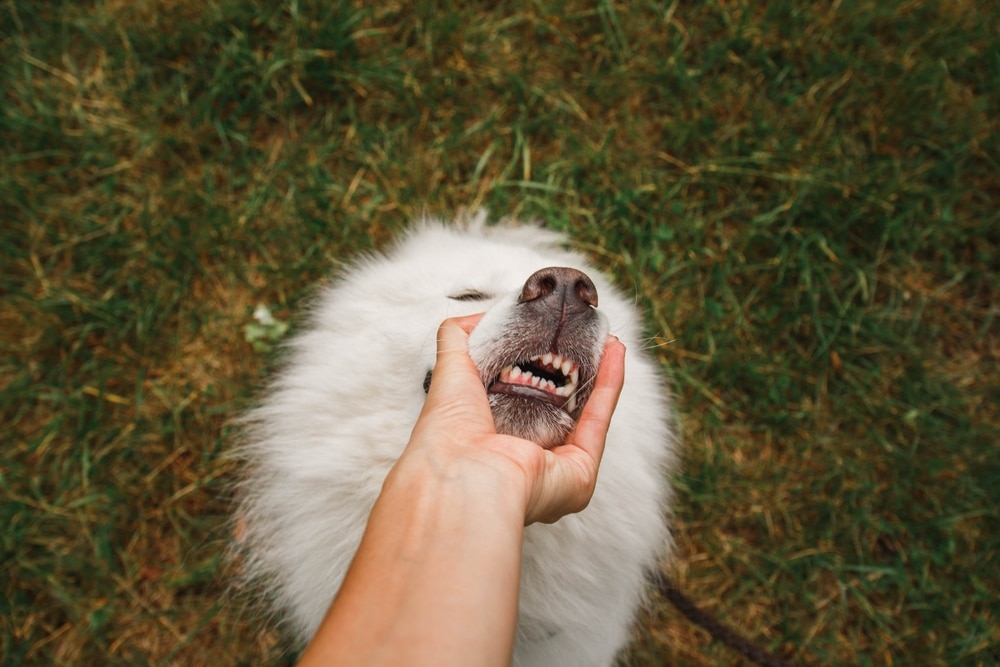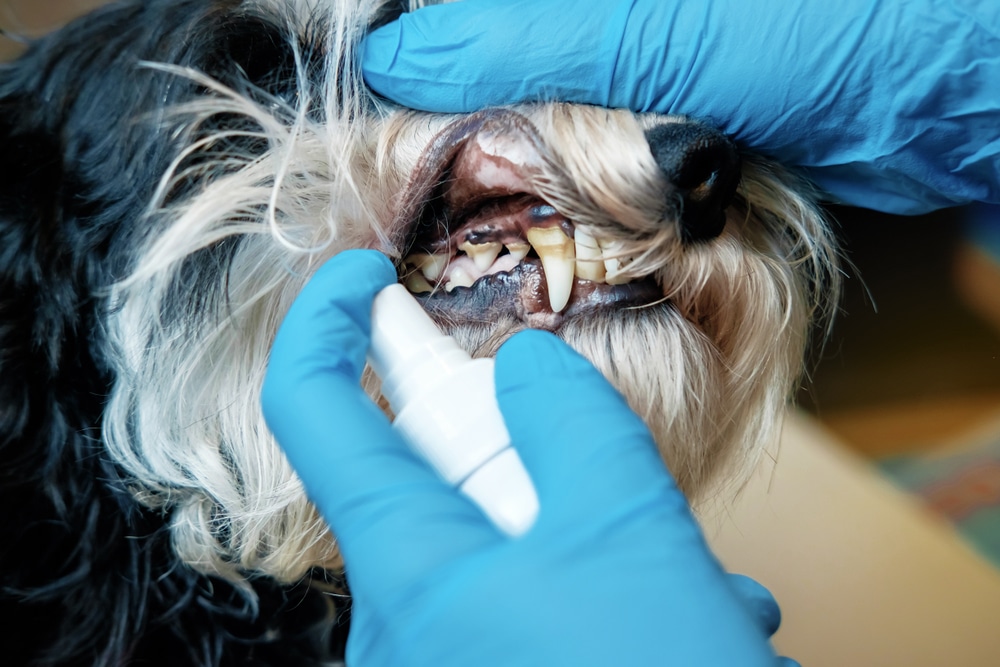When it comes to dogs, brushing and flossing twice a day isn’t usually part of their to-do list in order to maintain their oral health. That’s why today there are easier ways of doing that, like the convenient dental sprays, but having in mind the ingredients, what do vets think about alcohol in dog dental spray?
The majority of veterinarians agree that the possible benefits of using an alcohol-based dog dental spray are typically not worth the possibility of intoxication, especially in the long run. Remember that your pet will swallow anything you spray in their mouth instead of spitting it out and, as a result, will ingest the alcohol.
Table of Contents
What Are Dog Dental Sprays?
Some of the most treatable medical conditions that might affect our dogs are dental, gums, and mouth issues. Dogs should visit the veterinarian periodically to have their teeth cleaned. Just like humans, they should brush their teeth every day.
Every pet owner enjoys their dog’s fresh breath. They also know that healthy teeth and gums are essential for any animal’s well-being. However, owners find it difficult to brush because it may not be the most favored activity of their furry friends.
That’s why many turn to alternatives like dog dental sprays. They can be applied using a foam spray or a liquid pump. For dental disease, whitening, and fresh breath, the spray is applied directly to the dog’s mouth.
Since most solutions will mix with the dog’s saliva and move around the mouth as the dog licks and swallows, they don’t even need to be sprayed directly onto the teeth.
Dental chews are also a frequent aid in teeth cleaning. However, they do not do much to address the issue of bad breath. Items like these are designed to help you manage your pet’s oral health without the hassle and stress of brushing.
But how effective are these products? Can they actually replace the role of brushing, or at the very least serve as a useful addition to your pet’s dental care? The majority of experts agree that they shouldn’t be utilized alone and are unreliable when used that way.
Why Is There Alcohol in Dog Dental Sprays?
One of the many ingredients of dental sprays is alcohol. Companies include alcohol in their pet dental care products for several reasons.
One of the main reasons is that alcohol can eliminate the harmful oral germs that cause bad breath, tooth decay, and gum disease. Apart from the bad bacteria, it can also decrease the positive, beneficial oral bacteria.
Additionally, companies use it because it will saturate other ingredients more effectively than water and prevent the solution from going bad.
Alcohol is very affordable, which enables businesses to maximize their profits. It serves as a preservative and enables businesses to produce vast quantities of the sprays without worrying that they would spoil. Making larger batches that might spoil quickly is more profitable than doing it in smaller amounts.
The issue with using alcohol in pet dental care products is that utilizing alcohol-based solutions has negative effects, some of which are light and some of which are severe.
Is Alcohol in Dog Dental Sprays Dangerous?
The majority of the components used in pet dental care products are decided on research based on humans. Dogs and cats cannot metabolize alcohol the way humans can. That makes it unsafe for them to use the same products.
Additionally, it doesn’t take much alcohol to trigger major issues in dogs because they are smaller than people and more sensitive to it.
Xylitol is one component that veterinarians advise avoiding. It is an alcohol that can result in dangerously low blood sugar.
Remember that your pet will swallow anything you spray in its mouth because they are unable to comprehend the idea of spitting out the substance. As a result, pets may ingest variable amounts of alcohol that could be hazardous.
Even though it’s unlikely that your pet will consume significant amounts of pet oral care spray, a small dog can get alcohol poisoning by consuming just a very small amount of alcohol.
Symptoms Of Alcohol Ingestion
The main symptoms of quickly ingesting a large amount of alcohol are the following:
- Vomiting
- Diarrhea
- Seizures
- Lack of coordination
- Loss of consciousness
The effects of consuming very little alcohol for several weeks or months are a more frequent problem. This form of alcohol poisoning is more common with dental sprays, especially if they are used often.
Daily consumption of small amounts of alcohol over time has been linked to:
- Liver injury
- Kidney failure
- Decreased appetite
- Digestion issues
- Psychiatric conditions
- Breathing dysfunction
- Vision problems
As you can see, the hazards associated with using an alcohol-based pet dental spray typically outweigh any advantages over the long run.
Proper Care for Your Dog’s Teeth and Gums?

Brushing your pet’s teeth and gums every day is the best method to maintain good oral health and lower the risk of bad breath, cavities, and gum disease. It’s crucial to remember not to brush with your toothpaste! You can use regular water or pet-specific toothpaste. Just remember to check the ingredients first!
Additionally, routine cleanings at your veterinarian’s office will help keep bacteria levels under control.
Giving your pet a supplement in addition to proper brushing, routine cleanings, and (if your dog enjoys them) dental chews can maintain their oral hygiene without the need for an alcohol-based spray.
They should only be consumed in moderation, though, as dental chews are frequently high in calories and sugars, which can lead to weight gain.
In Conclusion: What Do Vets Think About Alcohol In Dog Dental Spray?
Brushing your dog’s teeth might be a bit of a tough task, but it’s the best way to keep its mouth, gums, and teeth, and with that, its overall health, in order.
So, how do you keep your dog’s teeth clean and its mouth stink-free? Let us know your thoughts and why in the comments below!
